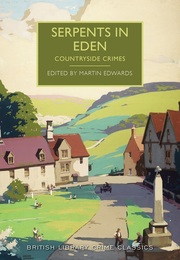
Serpents in Eden is edited by Martin Edwards, a prolific writer and mystery literature historian, and he appears to be the perfect candidate for the job. Edwards shows clear love for and knowledge of his field, and every story in the collection highlights those crimes and misdemeanors that can take place in an otherwise idyllic and deceptively safe country setting. This simple thematic link – and a natural one, both literally and figuratively, for a genre that has long found menace and shadows in rural isolation, from the Gothic secrets of Jane Eyre to Arthur Conan Doyle’s Sherlock Holmes adventure “The Copper Beeches” – lets the stories resonate and speak to one another in appealing (and cumulatively sinister) ways.
Other authors wisely make their idyllic surroundings an essential part of the mystery. H.C. Bailey, an underrated Golden Age author and creator of Reggie Fortune, sets “The Long Barrow” in Dorsetshire, where an archaeologist and his secretary may or may not be up to something more deadly than excavating ancient burial sites. R. Austin Freeman’s story “The Naturalist at Law” is especially intriguing as an example of early forensic research as Dr. Thorndyke investigates a drowning in a ditch. And with “The Fad of a Fisherman,” G.K. Chesterton presents a tale – not featuring Father Brown, but up to that philosopher’s clever paradoxical standards – of a government official found dead beside a country stream.
E.C. Bentley spins a curiously comical story of fraud committed at a vicarage in “The Genuine Tabard.” Anthony Berkeley Cox’s “Direct Evidence” is intriguing both for the author’s winking tone towards the genre – one character notes, for example, that it is “quite unthinkable that the brother of a girl who could play tennis like that should have committed a murder” – and when contrasted with an alternate version of this story. (“Double Bluff,” with a different murderer and outcome, appears in the Cox collection The Avenging Chance and Other Stories published by Crippen & Landru.) And Arthur Conan Doyle has a story here, “The Black Doctor,” which was written during his Sherlock Holmes years but does not feature the master detective. The events focus on the trial of a man accused of murdering a dark-skinned physician raised in the Argentine Republic but now practicing medicine in a quiet English village. The absence of Holmes doesn’t hurt the story, but a revelation that strains credibility is a bit more damaging. The approach is very explanatory and testamentary, as befits the late Victorian literary style, but the story still engages.
Another pleasure with a collection like this is the potential for discovering writers previously unknown to one. There were four here whom I had not read before, and I don’t think I will be actively seeking out their work, even though the samples here are competent. Best in show is Ethel Lina White’s melodrama “The Scarecrow,” concerning an escaped psychopath and an isolated farmhouse: the plot moves along and, like any good thriller writer, she knows which details to provide and which to hold back. Less memorable are “The Gylston Slander” by Herbert Jenkins (a successful publisher in his day job) and “Murder by Proxy” by M. McDonnell Bodkin, a story which suffers from an over-obvious murderer and a questionable alibi method. And Leonora Wodehouse, step-daughter of Plum, contributes “Inquest,” a well-written and somber story about the poisoning of a patriarch, the judicial investigation that follows, and a chance encounter on a train with two of the drama’s participants years later.
If you’re a fan of classic detective mysteries, you will thoroughly enjoy Serpents in Eden. Reading these unfamiliar stories written by some of the most creative minds of the era is like sampling the delights of an assorted box of chocolates, some lighter and sweeter, some darker and sharper, but all good. Just don’t trust the chocolates if it is Mr. Anthony Berkeley Cox who passes them to you.
Serpents in Eden: Countryside Crimes is available on March 1, 2016. An advance copy was obtained from Poisoned Pen Press via NetGalley for creating a written review.
 RSS Feed
RSS Feed